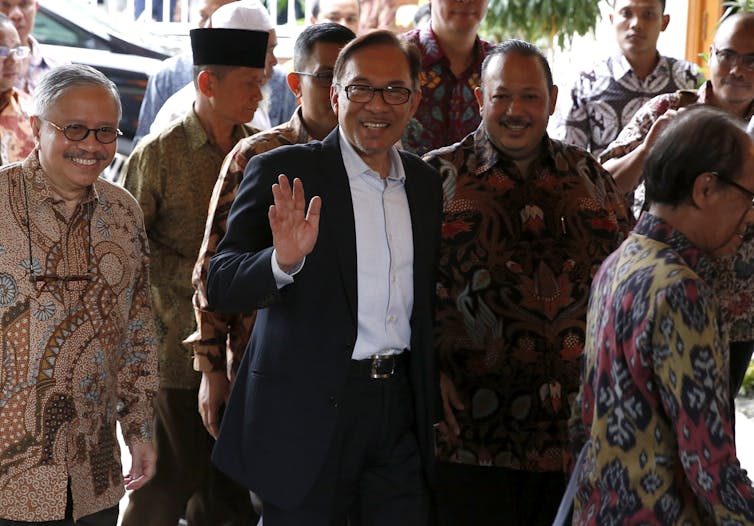Now that Malaysia has a new government, the real work begins reforming the country
- Written by James Chin, Director, Asia Institute Tasmania, University of Tasmania
The euphoria over the change of government in Malaysia is unlikely to die down soon. In fact, the honeymoon period for Prime Minister Mahathir Mohamad and his new government will probably last until the end of the year. Malaysians are keen to give the new administration some time to get itself organised. After all, the former ruling coalition, Barisan Nasional, was in power for a whopping six decades.
Plus, Malaysia has a host of thorny problems it must address now that Najib Razak is out of office and the 92-year-old Mahathir is back in power. If the country is going to have a bright future, it will need time to tackle these issues.
These are five areas the new administration must focus on in the next year if it’s going to put Malaysia back on track.
1. Civil service
The Malaysian civil service lost its professionalism many years ago. In recent times, it has behaved more like a branch of United Malays National Organisation (UMNO), the former ruling party that dates back to Malaysia’s creation, than a neutral group of committed civil servants.
It’s also widely been seen as a “job bank” for unemployed Malay youths and Malay graduates in courses with low employment prospects like Islamic studies. These young people have little chance of being employed in the private sector, thus for political reasons, they are absorbed into the civil service.
The end result is a bloated civil service of 1.6 million people, or about 5% of the total population, with low levels of productivity. An astonishing 40% of the government budget now goes to public-sector emoluments (comprising salaries, pensions, various allowances and financial benefits). This is not sustainable, even in the short run.
 Supporters of Mahathir Mohamad’s Pakatan Harapan alliance waving flags in front of the Royal Palace the day after the election.
Fazry Ismail/EPA
Supporters of Mahathir Mohamad’s Pakatan Harapan alliance waving flags in front of the Royal Palace the day after the election.
Fazry Ismail/EPA
2. Education System
There is also something seriously wrong with the Malaysian education system.
The proof is the increasing number of parents putting their children in expensive private schools instead of state-funded public schools. There are now 170 international schools in Malaysia. The number of Malaysian students enrolled in international schools is now the highest in Southeast Asia – even more than Indonesia, which has about eight times as many people.
Middle-class parents are moving to the private school system simply because the standard of education in state schools has dropped dramatically. Another reason is the creeping Islamisation of state schools. Non-Muslims, as well as some Muslim parents, are uncomfortable with the Islamic indoctrination occurring in some of these institutions during school hours.
Read more: Malaysia’s Bersih movement shows social media can mobilise the masses
Public universities aren’t producing quality graduates, either. Not only are these graduates lacking strong English language skills, they aren’t properly trained in their core disciplines.
The basic problem with Malaysian universities is they don’t promote on merit. The country’s racial quota for student intake – roughly 65% Malays to 35% non-Malays – has been extended to the recruitment of academic staff and vice-chancellors, most of whom come from the Malay ethnic group.
3. The Malay Agenda
This is a long-standing issue and perhaps the most taboo of all subjects. The previous Barisan Nasional (BN) regime was an unashamedly proud proponent of “The Malay Agenda”, a comprehensive system of affirmative action policies aimed at helping the majority Malay community and other indigenous peoples (collectively referred to as Bumiputeras). Quotas for Bumiputeras have been established in all aspects of Malaysian life, from scholarships and government contracts to business licences and even special discounts for new properties.
The problem was that the policy led to corruption and became a tool to control the Malay population. Malay businesspeople who were anti-government did not receive contracts, while others were denied government help. Malay students often had their scholarships terminated if they supported the opposition.
4. Political Islam
In the past decade, there’s been explosive growth in the number of groups using Islam for political mobilisation. Many of these groups promote the idea of Ketuanan Islam (Islamic supremacy) and the creation of an Islamic Malaysian state. They also have an exclusive view of Islam and demand that non-Muslims, currently about 40% of the population, be denied their full political rights and be treated as dhimmi, or a “protected minority” with very limited political rights.
The previous BN regime actively courted these Islamic groups with hopes of capturing the Islamic vote. In the process, the state itself became more religiously conservative.
Read more: Malaysia reaches a critical crossroad over state Islamisation
In the Malaysian states of Sabah and Sarawak on Borneo, this has created political cleavages where none had existed. The majority indigenous populations of both states are largely non-Muslim and wary of the strong push towards the creation of an Islamic state. This rise of political Islam now has the potential to fuel secessionist groups among those who fear their freedom of religion is being taken away.
 Anwar Ibrahim, shortly after his release from prison this month.
Adi Weda/EPA
Anwar Ibrahim, shortly after his release from prison this month.
Adi Weda/EPA
5. Transition Date
One of the new ruling coalition’s key promises was to transfer power from Mahathir to Anwar Ibrahim, the long-time opposition leader recently released from prison. This transfer is expected to happen within two years.
There are concerns, however, that Mahathir and Anwar may not be able to come to an agreement on the handover date. If the transfer of power does not take place, there’s a real likelihood the entire winning alliance will fall apart. This would be disastrous for the country’s much-needed reform agenda.
The challenges faced by the new administration should not be underestimated. The old ruling party had been in control since the mid-1950s and it will take time and political skills to manage the change.
The mistake often made by new governments is to put off the most difficult challenges until they are more firmly established and stable. History in this part of the world would suggest otherwise.
Authors: James Chin, Director, Asia Institute Tasmania, University of Tasmania



















